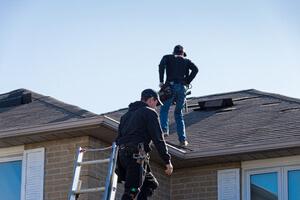Many Home Buyers Waiving Home Inspection Contingency
 One of the surprising trends to occur during the COVID-19 pandemic – and one that has continued long beyond it – is how competitive the residential real estate market has become. It is not an uncommon sight for a “under contract” sign to go up within days of the “for sale” sign being put out. It is also not unusual for a bidding war to take place, with potential buyers offering even more than what the asking price of the home is. There is no doubt that this period has been a seller’s market, however, this can sometimes mean that a buyer is willing to waive certain contingencies in order to seal the deal. But this can turn out to be an expensive mistake.
One of the surprising trends to occur during the COVID-19 pandemic – and one that has continued long beyond it – is how competitive the residential real estate market has become. It is not an uncommon sight for a “under contract” sign to go up within days of the “for sale” sign being put out. It is also not unusual for a bidding war to take place, with potential buyers offering even more than what the asking price of the home is. There is no doubt that this period has been a seller’s market, however, this can sometimes mean that a buyer is willing to waive certain contingencies in order to seal the deal. But this can turn out to be an expensive mistake.
Waiving Contingencies
When a seller agrees to a potential buyer’s offer, they will sign an Offers to Purchase contract. This contract covers the purchase price agreed upon by both parties, as well as other terms. One of the most critical terms is the amount of time the seller has to accept the buyer’s offer. This contract also often has contingencies that allow either party to cancel the contract without legal liability.
One of the most common contingencies a buyer usually includes is the home inspection. If the home inspection reveals any major issues, this contingency allows the buyer to pull out of the contract and get their deposit back. This gives the buyer time to make sure that there are no issues with the structure, electrical, plumbing, or other potentially expensive or dangerous issues before they sign the Purchase and Sales Agreement.
However, with the current residential real estate market boom, many buyers are waiving the home inspection contingency and agreeing to purchase the property “as is.” According to the National Association of Realtors, approximately 20 percent of all home buyers last year waived the home inspection contingency.
One of the most common reasons why buyers are waiving the inspection is due to time constraints in the Offers to Purchase contract. Because the market is so busy, many home inspectors are booked weeks in advance and a potential buyer may not be able to get an appointment before the deadline agreed upon in the contract, resulting in losing their chance at buying the home.
It is critical for a buyer to understand that by waiving the home inspection, not only are they risking purchasing a property that may have serious defects, but there may also be issues when it comes to obtaining insurance for the property due to the defects. It also takes away any leverage at negotiating a lower price. For example, if a home needs a new roof, the buyer can negotiate with the seller that they need to either have a new roof installed prior to the sale or deduct the cost of one from the purchase price.
Another critical issue of not having the home inspected is that should the buyer learn of these defects prior to the closing, they will still have no legal standing to cancel the purchase and sales agreement contract.
Contact a Fairfield County Real Estate Lawyer for Assistance
If you are purchasing a home, you want to make sure you are fully protected against any potentially devastating financial issues. A skilled Stamford, CT real estate attorney can make sure that you are not entering into a purchase agreement that could turn into a financial headache down the road. Call Law Offices of Daniel P. Weiner at 203-348-5846 to schedule a free consultation and find out what types of legal options you may have.
Source:
https://www.washingtonpost.com/realestate/competitive-buyers-waive-contingencies-to-score-homes-in-tight-market/2021/06/02/d335b050-af2c-11eb-b476-c3b287e52a01_story.html







